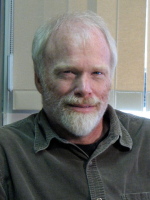Dr. Martin Plumer

Honorary Research Professor
- B.Sc. St. Francis Xavier
- M.Sc. Dalhousie
- Ph.D Toronto
Contact Information
Email: plumer @ mun . ca
Personal Home Page
Research - Condensed Matter Theory
Magnetic phenomena can occur in a huge variety of materials. With advances in computing power, we are able to learn more about how magnetic moments are arranged in increasingly complex systems. These moments can be associated with individual atoms in a crystal or as a part of larger nanometer clusters in thin films. In each case, the geometry of the system plays a major role in determining the arrangement of the magnetic-moment directions, which can be quite complex. Numerical techniques have been developed to study how the orientation of the magnetic moments change with changing temperature, pressure, and applied magnetic field. Part of our work focuses on geometrically frustrated antiferromagnets, where the interactions between neighboring atoms in a crystal cannot all satisfy the preference of the atomic magnetic moments to be anti-parallel. New examples of frustrated antiferromagnetic materials are being discovered regularly, such as those which also exhibit the technologically important magnetoelectric effect where an applied magnetic field induces a detectable voltage. We also study thin ferromagnetic films of interest to the data storage industry for a variety of purposes. This includes materials used in hard drives. As the density of data increases, the magnetic grain size must decrease until the superparamagnetic limit is reached, where thermal motion causes spontaneous moment reversal and data is lost. Our work will aid in revealing what properties of the thin films are needed to prevent this from occurring. A significant benefit of the theoretical and numerical studies we perform is the close collaboration with experimental groups at Memorial and elsewhere. This can be particularly rewarding for trainee researchers.